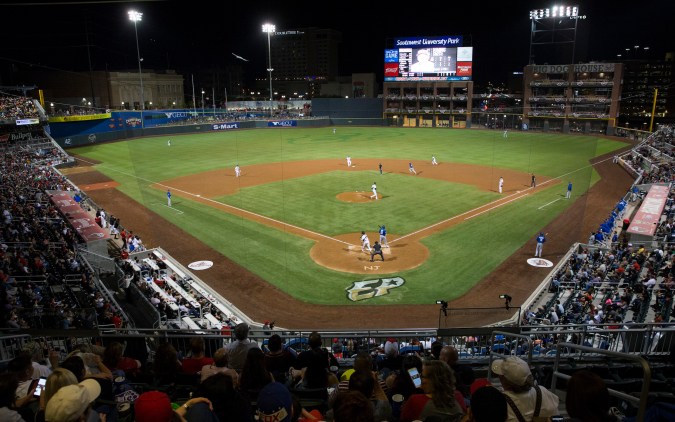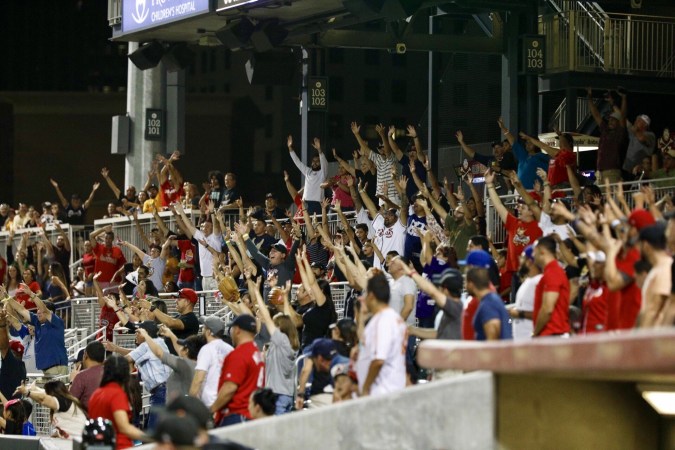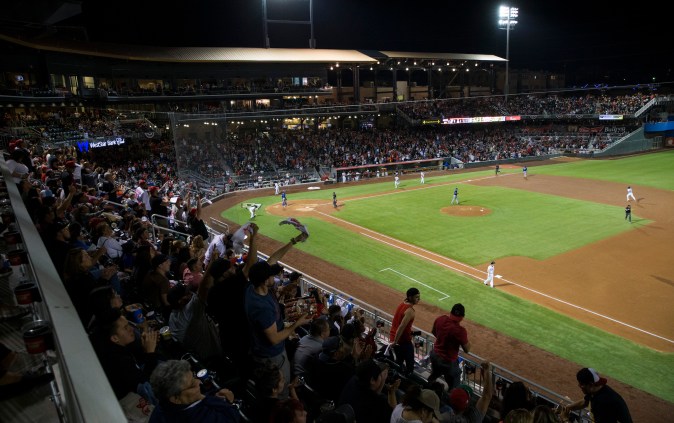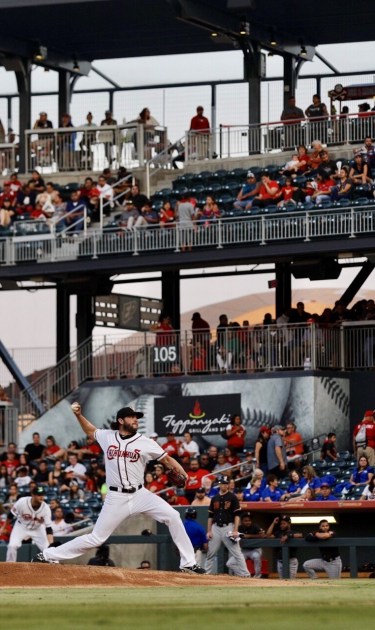From the top of the Wooftop Deck at Southwest University Park, you see two different worlds. To the right, the Franklin Mountains overlooking El Paso, and to the left, the Juarez Mountain–with its famous inscription “La Biblia Es La Verdad, Leela”–overlooking Ciudad Juarez. In the middle, the ballpark is home to the El Paso Chihuahuas, a minor league affiliate to the San Diego Padres, who play Triple-A ball for the Pacific Coast League.
Deep in its 4th season in 2017, the Chihuahuas already boast 2 division titles and a league title, won last year against the Pacific Coast League finals against the Oklahoma City Dodgers. The early success and location in downtown El Paso, less than a mile away from the Mexican border, has garnered them many fans both in the US and Mexico.

Although this current iteration of the team is only a few years old, the roots and history of baseball on the borderland run deep, going as far back as 1892. Starting out as the El Paso Browns, the team went through a variety of changes and Southwest cliche names, like the Mavericks, Texans and Sun Kings. Although constantly changing ownership and names, one thing was consistent for decades: the home field, and the advantage that comes from that consistency. From 1924 to 1989, almost every iteration of the team played its home games at Dudley Field in south central El Paso.
The fans at Dudley Field saw many major leaguers come and go throughout their years as affiliates to several MLB teams. In an odd twist, arguably the most famous person to have El Paso on his uniform never made it to the major leagues. In 1973, a second-base prospect for the California Angels joined the El Paso Sun Kings. The then-22-year-old Kurt Russell (yes, that Kurt Russell) led the league in hitting that season, with a .563 batting average while on the Sun Kings. Unfortunately, both his season and eventual baseball career were cut short when he collided with a player running to second and tore his rotator cuff. In interviews, Russell has said he had been called up to the majors prior to the injury; to be fair, he found some minor success as an actor, so all’s well that ends well.
After the Sun Kings came the devils. The El Paso Diablos were the minor league team in the cityfrom 1974 to 2013 and, more notably, they were the first iteration to really incorporate the importance of El Paso’s Latino culture–along with the fact that it’s hot as hell in the city–with a Spanish-language name. The Diablos are the real precursors to the modern day Chihuahuas, and that team left behind the biggest legacy for baseball in El Paso. Most notably, the Chihuahuas adopted the skill that the Diablos once had for promotions.

When Diablos owner Jim Paul bought the team in 1974, his best bet for reviving a struggling team in a small market was to give away a lot of free stuff. Paul is credited for creating the promotions-heavy fun that is built into minor league baseball games, not just in El Paso but in the entire country.
Paul understood that El Paso was full of immigrants with families with little income, so he chose a two-pronged strategy to get people in the door: cheap admission and lots of fun deals like the 10-cent hot dog. After the revenue for the Diablos grew exponentially, other teams took notice and began attending seminars to learn from him. Current promotions like Star Wars night or $1 hot dogs can trace their genesis back to Jim Paul and the El Paso Diablos.
Due to their growth and success, the Diablo’s eventually outgrew Dudley Field and moved into Cohen Stadium, a new field in Northeast El Paso. The Diablos enjoyed success throughout the 90’s in the new field until 1999, when Paul sold the team. Around the same time, the Diablos’ affiliations with major league teams ended, which saw their Double-A league status sold to the St. Louis Cardinals, who subsequently moved that affiliation to 2004. As an independent team, the Diablos hung around in El Paso, changing leagues and owners until they played their last game in 2014.
When the announcement of a new team was made in 2012, the reception wasn’t all kind. As with any new stadium, there was a lot of backlash surrounding the construction and financing of Southwest University Park, but the idea to bring the team back downtown near the border was intriguing.

With one of the largest Latino populations in the United States in its home city of El Paso, the Chihuahuas made an effort to once again present “America’s Pastime” to a largely Latino audience. The mascot–which was decided by a popular vote prior to the first season–is not only a reference to the small yet ferocious canine, but also the state of Chihuahua, in which Juarez resides. The stadium pays tribute to El Paso’s baseball past with areas like the Sun Kings Saloon, and the stadium is covered with historical memorabilia tying the Chihuahuas back to previous teams in the area. For the 2017 season, the team even paid tribute to their roots with Diablo Days: every Wednesday, they wore throwback jerseys honoring the team so many grew up watching at Dudley Field.
Aside from presenting a sport that is also greatly popular across Latin America, the Chihuahuas learned from Jim Paul and engage via a series of promotions throughout the year aimed directly at its Latino community. In the past, the Chihuahuas have done promotions like Selena Night, honoring the late Queen of Tejano. They always play corridos during the 7th inning stretch and invite the fans to participate in a “grito” contest. In addition, the Chihuahuas’ Lucha Libre Night this season brought in fans that spent their youth watching luchadores like Mil Mascaras and El Blue Demon performing in arenas across Juarez.
The success in the community–the team averages an attendance of roughly 8,000 fans per game, high for a minor league team outside of a major city–has translated onto the field, as the Chihuahuas are headed back to the Pacific Coast League playoffs after winning the Southern Division in 2017. More importantly than that, and than its affiliation with the Padres, is the connection that the team has honored, not just to the ghosts of El Paso baseball past, but also to the reality of its location as a bordertown team between the United States and Mexico.




